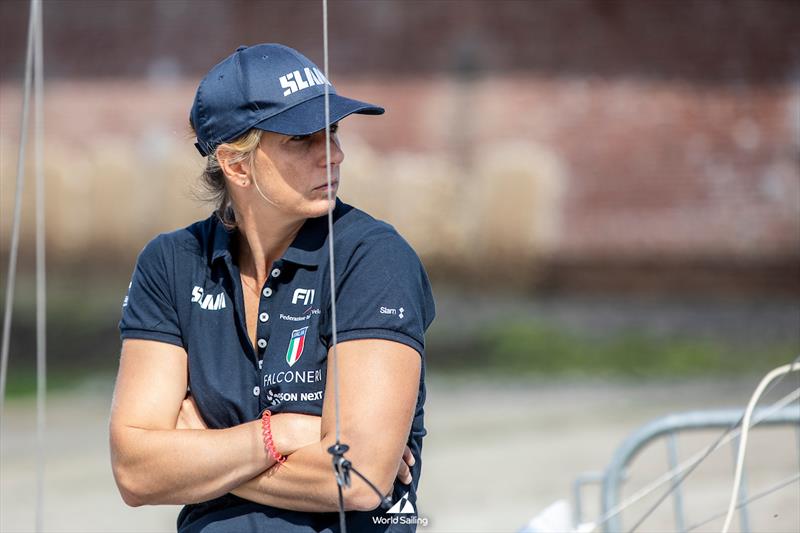
From champion to advocate: Caterina Banti exposes “equality” in sailing
by Alexia Lahoud, 49er and Nacra 17 Sailing 1 Nov 14:41 GMT

2023 Allianz Sailing World Championships © Sander van der Borch / World Sailing
After winning her second consecutive Olympic gold medal in Paris, 37-year-old Caterina Banti has decided to step back from competitive sailing. This choice was a thoughtful one; she feels a pull toward new life adventures beyond the wind and waves.
This summer was packed with excitement for sailing fans: Team New Zealand won the America's Cup for the third time in a row, and Italy brought home two Olympic golds in the Mixed Nacra 17 and Women's Windsurfing events. Italy's America's Cup team, Luna Rossa, also had a rollercoaster season, with a tough loss against the British after a promising start. But for sailors like Banti, the sport is about much more than wins and losses; it's a lifestyle built on passion, hard work, and sacrifice. Her decision to step away, especially while at her peak, stirred admiration in the sailing world—particularly because she's candid about the unique challenges women face in the sport.
More than just an athlete
Banti is unique—not only for her incredible talent but also for her path to get there. Unlike most pro sailors, she didn't start competing until age 23. Before sailing, she focused on her studies, earning degrees in Eastern and Mediterranean History and learning multiple languages, including Arabic and Turkish. This academic background gave her a broader perspective, one she feels has helped her think independently and challenge some of the traditional norms in competitive sailing.
The physical journey
Growing up, Banti faced taunts about her weight, often being teased as a teenager which led to a brief struggle with bulimia.
Reflecting on her journey, Banti acknowledges the challenges she faced growing up. "As a child, I was chubby, and they called me 'bantenottera.' I struggled with bulimia, which forced me to confront my body as a teenager. Learning to accept myself and push my limits became my first real competition. A medal is not won without addressing personal challenges. No one is perfect; success is about growth and embracing diversity, not just individual achievements. There's always something to learn from others, and we should never be ashamed to ask, 'How did you do it?' The world is evolving, and we need to move beyond stereotypes.
When she took up competitive sailing, she underwent a major physical transformation to meet the physical demands of the Nacra 17 class, where strength and endurance were crucial. To succeed as a bowwoman, she gained over 10 kilograms of muscle in just two years, pushing her body to its limits. "Sport has given me so much," she shared, "but I also gave it everything—my knees, back, hands, wrists, and ankles." Learning to accept her body and push beyond her limits became just as important to her as winning medals.
Gender bias in the sailing world
Banti also felt anger and disappointment regarding the gender dynamics in sailing. She believes the sport still caters mainly to men, with "initiatives" for women often feeling more like token gestures than genuine progress. Even though the International Olympic Committee (IOC) promotes the 2024 Paris Olympics as the first-ever gender-equal games, featuring 50% male and 50% female participants, Banti was taken aback to see her name absent from the Women's World Sailor of the Year category. Instead, her male teammate, Ruggero Tita, received a nomination in the Male World Sailor of the Year category, even though they achieved every title together, including world championships and two Olympic golds. Both were recognized as a team in the "Team of the Year" category, but Banti was overlooked for individual recognition, despite matching Tita's accomplishments.
While genuinely pleased for Tita's nomination, she couldn't help but question the decision—especially considering that even the young mixed team of Vittorio Bonifacio and helmswoman Lisa Vucetti faced a similar exclusion in the youth category despite competing together.
The Italian Sailing Federation (FIV) immediately asked for explanations, raising the question: why do women seem to disappear from view at certain points? "It's happening at a time when the Olympic world, federations, and national Olympic Committees like CONI (the Italian Olympic Committee), and even the America's Cup are moving toward gender equality," she noted.
Old-school stereotypes
Banti has been outspoken about some of the outdated views she sees in the sailing world, including from figures like Luna Rossa's owner, who reportedly still favors all-male teams for the America's Cup. "He is a man from another time, when women were seen as bringing bad luck. But these are just stereotypes," she argues. "If we're not given the opportunity to prove ourselves, how can we be judged as unfit? The media often focuses on whether Rugger and I are a couple rather than our successful partnership as teammates." She argues that these stereotypes limit the sport, especially when women aren't given a fair chance to prove themselves on an equal playing field.
Moving on and looking ahead
Now that she's stepping away from competitive sailing, Banti is eager to explore new avenues in her life. She wants to focus on her family, possibly start her own, and return to her studies. Enrolled in leadership courses, she aims to work in roles that foster positive change in sports change. "I believe that athletes should broaden their perspectives," she emphasizes. "Sports can be a personal, social, cultural, and political redemption."
Banti's experiences have shaped her into an advocate for change, encouraging others to challenge the stereotypes that persist in sailing and beyond. She wants to inspire women to embrace education and personal growth, arguing that the journey to success is about more than just medals—it's about growth, understanding, and empathy. "Men and women can sail together and win together, both on the water and in life. We've shown that. The question is: does anyone care?"